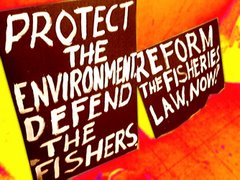

At the Environment Management Bureau Office with the local Media

At the office of Provincial Board Member Victo r Maambong
Below is the letter calling for a moratorium and investigation over off-shore mining in the Visayas given to the Provincial Government and the Department of Energy.
Another letter calling for the recall of JAPEX' Environmental Compliance Certificate was given to the office of the Environment Management Bureau. Currently the Provincial Vice-Governor of Cebu, the Congress, including the Philippine Senate passed resolutions calling for various actions against off-shore mining.
For a copy of the House Resolution regarding off-shore mining, please email us.
---------------------------------------------------------------------------
August 15, 2007
Atty. Victor Maambong
Provincial Board Member
Chairperson
Committee on the Environment
CALL FOR A MORATORIUM ON ALL PLANNED AND EXISTING OIL EXPLORATIONS IN THE VISAYAS
Dear Hon. Maambong,
Greetings.
The Central Visayas Fisherfolk Development Center Inc, and various organizations under DEFEND our Sea Coalition and Conservation Watch, manifests its concern on the plight of the marginal fisherfolks whose livelihood were affected by oil explorations in fact majority of Fishermen in the Visayas were not justly compensated when JAPEX and NorAsian Energy Ltd implemented their seismic survey. We would like to extend the same concern to our local marine environment deemed as one of the global centers in marine biodiversity when oil explorations and off-shore mining will commence.
According to the paper presented by DOE USEC Guillermo Balce, another 23 Service Contracts will be awarded to various corporations to conduct oil exploration activity in our waters another service contract was awarded to Forum North Cebu to conduct exploration activity, it is interesting to note that this activity will be inside made inside the Visayas Sea considered as a unique world treasure and recognized as a national heritage area.
Based on international scientific papers, seismic survey and off-shore mining will pollute our waters since Oil and Gas drilling operations generate huge amounts of waste that is discarded into water. According to the National Academy of Sciences, a single well produces between 1500 and 2000 TONS of waste material.
Debris includes drill cuttings, which is rock ground into pieces by the bit; and drilling mud brought up during the drilling process contains toxic metals such as lead, cadmium and mercury. Other pollutants, such as benzene, arsenic, zinc and other known carcinogens and radioactive materials are routinely released in “produced water,” which emerges when water is brought up from a well along with the oil or gas.
Offshore drilling will cause a significant amount of air pollution. Each offshore oil platform generates approximately 214,000 pounds of air pollutants each year(National Oceanographic & Atmospheric Administration). An average exploration well for oil or natural gasgenerates some 50 tons of nitrogen oxides (NOx), 13 tons of carbon monoxide, 6 tons of sulfur dioxide, and 5 tons of volatile organic hydrocarbons7. These pollutants are the precursors to smog, acid rain and contribute to global warming.
These projects will also spill oil to our more than the volume that destroyed Guimaras.Oil is extremely toxic to a wide variety of marine species, and current clean up methods are incapable of removing more then a small fraction of the oil spilled in marine waters. Offshore drilling platforms and pipelines spilled 1.8 million gallons of oil in U.S. waters from 1990-1999 in 224 reported accidents – that’s an average of almost 500 gallons a day.
Oil spills present the potential for enormous harm to deep ocean and coastal fishing and
fisheries. Oil waste poisons the sensitive marine and coastal organic substrate, interrupting the
food chain on which fish and sea creatures depend, and on which their reproductive success is
based. Commercial fishing enterprises may be affected permanently. Wildlife other than fish and
sea creatures, including mammals, reptiles, amphibians, and birds that live in or near the body
of water, are also poisoned by oil waste.
The hazards for wildlife include toxic effects of exposure or ingestion, injuries such as smothering and deterioration of thermal insulation, and damage to their reproductive systems and behaviors. Long-term ecological effects that contaminate or destroy the marine organic substrate and thereby interrupt the food chain are also harmful to the wildlife, so species populations may change or disappear.
During the seismic survey of JAPEX and NorAsian, a significant reduction of fish catch were
recorded, it was later found out that heavy metals contamination from seismic survey will
result to reduction of fish reproduction.(Cadmium EbrahimTi, et al. 1995 Kime, et
l. 1996, Lead - Ruby, et al. 1993, Mercury - Khun & Weis. 1987, Methylmercury - Van Look,
K. Journal of Fish Biology. 2003.)
Seismic blasting damages planktonic eggs and larvae found in the immediate vicinity of airguns (Dalen and Knutsen, 1985) and can reduce catches in commercial fisheries (Slotte et al. 2004; Soldal and Loekkeborg, 1993; Engas et al. 1996; Skalski et al. 1992) since the impact of the sound underwater tends to bursts air bladders (i.e. swim bladders for fish, lungs for marine mammals and the animals may have well sunk to the ocean floor from ruptured lungs. Andrea Leonor Bautista,manager, Cetacean Research and Conservation Project - WWF. (inq7.net. Thu, Sep 08, 2005) Seismic blasting can damage the hearing structures, (McCauley et al. 2003) and can cause body tissues to hemorrhage (hastings, 1995) and damage reproductive organs in marine organisms (Jensen and Alberdice, 1989)
Seismic blasting can cause behavioral modifications and reduce or eliminate available habitat for
breeding / spawning, foraging and migration (Richardson et al. 1986; Harris et al. 2001;
McCauley et al. 2000; McCauley et al. 1998) Seismic noises can alter fish distribution by tens of
kilometers (Slotte et al. 2004; Engas et al. 1996) It can elicit physiological stress and
neural-immune responses in Marine organisms (Santulli et al. 1998; Romano et al. 2004)
Despite the damages, despite the fisherfolks were denied access to their fishing grounds fisherfolks from various communities were not justly compensated or were not compensated at all.
With this we would like to ask the your committee to issue a moratorium on all oil exploration activities and bring together all the stakeholders in a public hearing to discuss the cost and benefit of oil explorations.
We must conduct exhaustive public consultations to discuss the issues and concerns on the conduct of the oil exploration. It is noted that the consultations are limited only to “information” dissemination which is far different from the nature of a consultation where people are given enough time to engage the proponents in a healthy dialogue. Two to three hours of meeting in each of the affected municipalities are not enough compliance of the consultation requirements as provided by law.
The Local Government Code provides:
SEC. 27. Prior Consultations Required. - No project or program shall be implemented by government authorities unless the consultations mentioned in Sections 2 (c) and 26 hereof are complied with, and prior approval of the sanggunian concerned is obtained: Provided, That occupants in areas where such projects are to be implemented shall not be evicted unless appropriate relocation sites have been provided, in accordance with the provisions of the Constitution.
We are also calling on our Governor, Mayors, Sangguniang Bayan/Panlungsod, and our Congressional Representative to exercise their authority and influence to lobby with the national government to address our concerns before the actual conduct of the seismic survey.





No comments:
Post a Comment